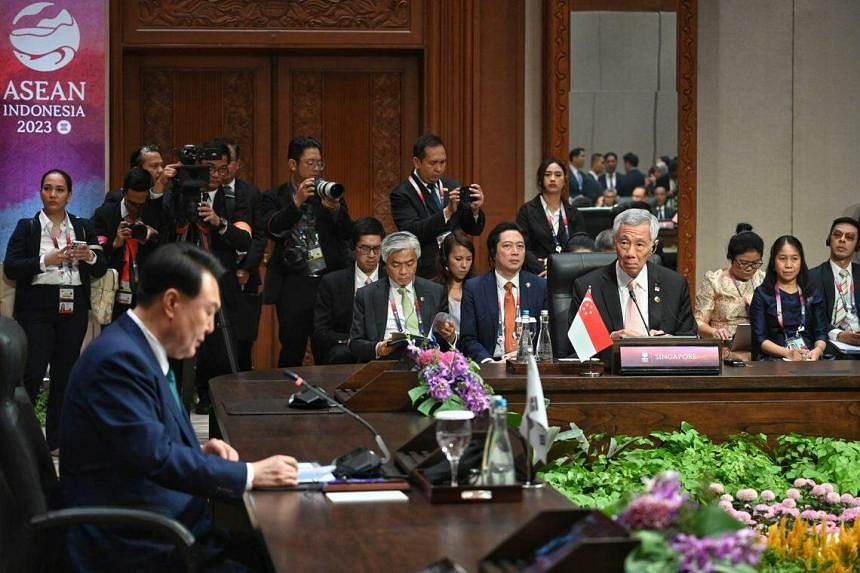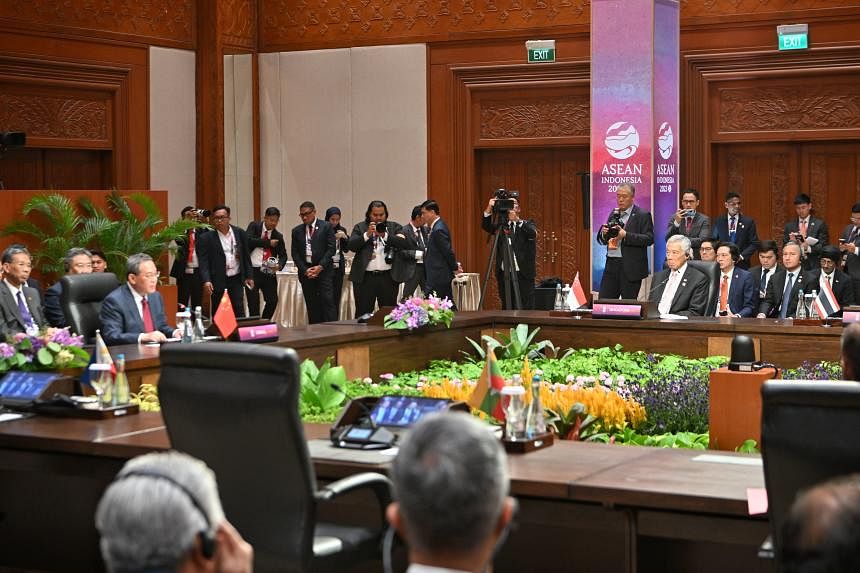JAKARTA - South-east Asia is watching the trajectory of the United States-China relationship with great concern, as tensions between the two countries could easily stoke existing flashpoints in the region, Prime Minister Lee Hsien Loong said on Wednesday.
Should this happen, the peace, prosperity and stability that Asean has enjoyed for decades could be undermined, PM Lee warned.
Speaking at a meeting between bloc leaders and Chinese Premier Li Qiang, PM Lee said it was crucial for both China and the US to continue talking to each other, build strategic trust at all levels, and strive for greater cooperation. “Both the US and China need to show leadership to address a whole range of global issues affecting all of us.”
Asean leaders are in the capital of Indonesia for the 43rd Asean Summit and related meetings, where they will also have talks with external partners.
In a meeting that bloc leaders had with United States Vice-President Kamala Harris later on Wednesday, PM Lee reiterated that the US-China relationship is a longer-term concern for the region.
“South-east Asia is concerned that a miscalculation could draw the region into serious conflict,” he said.
In the meeting between Asean and China, PM Lee said that the two have forged close bonds of friendship over the past three decades.
“As we look ahead to the next phase of our comprehensive strategic partnership, I am confident that we will build an even stronger Asean-China relationship based on mutual trust and respect,” he said.
He suggested two areas in which Asean and China can more closely cooperate, to build upon their upgraded relations brought about through the comprehensive strategic partnership in 2021.
The first is connectivity, where both sides should further liberalise the Asean-China Air Transport Agreement, he said, as this would further encourage people-to-people exchanges. The second is the digital economy, he added, in which more should be done to allow cross-border transactions to take place seamlessly and sustainably.
Such efforts support the Asean Outlook on the Indo-Pacific (AOIP), said PM Lee.
The AOIP lays out the bloc’s common position on regional cooperation, security and prosperity, as well as its stance on not taking sides with any major powers competing for influence in the region.
In the Asean chair statement on Wednesday, the support of all partners to the AOIP was appreciated.
However, the statement “expressed concern over the intensifying geopolitical tensions in the region, and further underlined the value and relevance of the AOIP to Asean’s peace, security, stability and prosperity”.
By supporting this initiative, trust and confidence to address challenging issues can be built, said PM Lee, offering as an example the disputes in the South China Sea.
The waterway has overlapping territorial claims by China, Taiwan and four Asean states – Brunei, Malaysia, the Philippines and Vietnam.
Recently, tensions have also simmered over China’s new national map featuring a 10-dash line that includes the waters off the South-east Asian nations’ coasts as well as part of the north-east of India, triggering objections from several sides.
PM Lee said Asean and China have continued to engage each other to maintain peace and stability in the area. “And we should intensify efforts to conclude a code of conduct that is in accordance with universally agreed, recognised principles of international law, including the 1982 Unclos (United Nations Convention on the Law of the Sea), and also safeguards the rights and interests of all parties,” he said.
Unclos is an international legal framework that governs the oceans and seas.
During talks between Asean leaders and Ms Harris, PM Lee said that the continued role of the US in the region was an important foundation of South-east Asia’s peace, stability and prosperity, and that the bloc would welcome efforts to further enhance cooperation.
Asean supports and looks forward to the establishment of a US-Asean Centre, he added.
The White House said that the centre, based in Washington, would serve as a key hub for Asean’s engagement with the US and facilitate official engagements and capacity building programmes, as well as conduct research.
PM Lee said the bloc is also happy with initiatives taken with the US so far, such as the launch of the comprehensive strategic partnership between Asean and the US in 2022.
“To sustain our good relations over the longer term, we need to expand people-to-people exchanges and deepen institutional links.”
Asean leaders had a separate meeting with their counterparts from South Korea and Japan, as well as a combined meeting with the two and China.
In the meeting with South Korean President Yoon Suk-yeol, PM Lee suggested prioritising the proposed upgrade of the Asean-Korea Free Trade Agreement to keep it relevant and fit for purpose.

Bolstering cooperation in emerging sectors such as the digital economy, fintech and cyber security was also brought up, and PM Lee said that these areas underpin Asean’s post-pandemic recovery and will be key engines of growth.
He also said the situation in the Korean Peninsula is worrying. Singapore has consistently condemned North Korea’s missile launches, as these have further raised tensions there and violated United Nations Security Council resolutions.
“Singapore will continue to work with the international community to promote peace and stability on the Korean Peninsula. We hope that Asean-centred fora such as the Asean Regional Forum will provide a useful platform for constructive dialogue,” he said.
In a separate meeting that Asean leaders had with Japanese Prime Minister Fumio Kishida, PM Lee said Japan can further cooperate with the region in the areas of climate change and the green economy, as well as connectivity.
He also underlined how Japan is an important partner in the region’s digitalisation efforts, as well as an active contributor to its capacity building in cyber security. “Asean and Japan should continue working towards an open, inclusive and interoperable digital ecosystem.”


